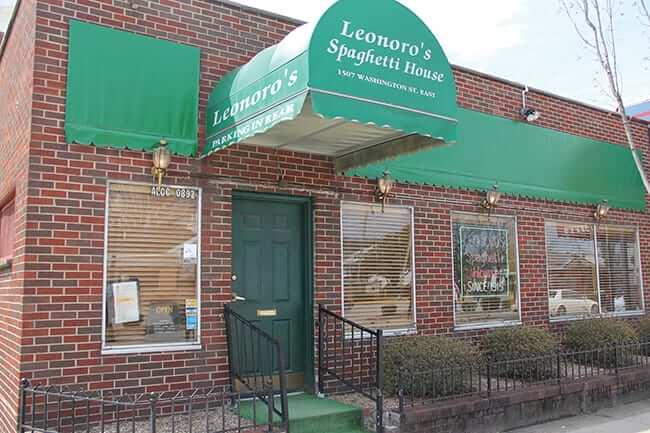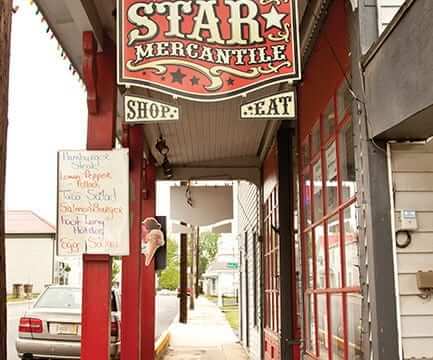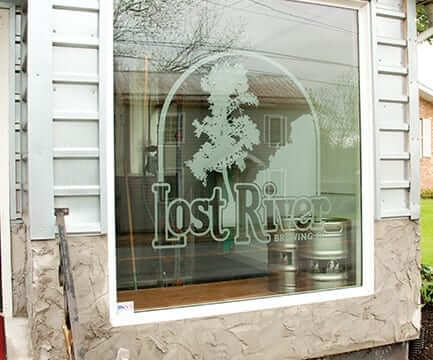Leonoro’s Spaghetti House celebrates 100 years in the Capital City

The dogwood trees are planted, LED lights are going up on storefronts, and new business opportunities seem to arise every day. Wardensville may be a city of less than 300 people, but this small Hardy County community is thriving.

“This town has been ignored for so long, but the bones are here,” says Paul Yandura, chair of Wardensville Main Street and co-owner of Lost River Trading Post—an inviting store complete with art gallery and coffee shop on the main thoroughfare through town.
Created in 2014, Wardensville Main Street was working to become an official nonprofit in April. Yandura and colleagues hope the group will eventually become a recognized member of the Main Street West Virginia program, which would connect Wardensville to more grant opportunities. “We’ve been on their radar,” he says. They also expect to be part of Main Street’s ON TRAC (Organization, Training, Revitalization and Capacity) program by year’s end.
“Everything we think about, we’re thinking, ‘In the next five years, what can we do to make this a destination?’” Yandura says. Locals are preparing for the inevitable completion of Corridor H, which will eventually allow traffic to bypass the small town when traveling from the D.C. area into West Virginia. Currently a two-lane road takes vehicles right through Wardensville, past businesses like the newer Lost River Trading Post and Lost River Brewing Company as well as the longtime Star Mercantile, a beloved storefront that’s part diner, part gift shop. That route is how Yandura, who lived 100 miles away in D.C. for years before moving to Wardensville, fell in love with the area.
He says some West Virginia towns have struggled with the development of the major highway, while others, like Thomas and Davis, thrive as they’ve already made names for themselves. He says completing the highway around Wardensville could take anywhere from six to 15 years, but either way, officials are preparing. “We’ve set five to six years as an emergency point,” Yandura says. “So people already know how amazing it is here—so it’s not like, ‘Should we stop in Wardensville?’ They already know.”
The city, the Main Street initiative, and even the Eastern West Virginia Community & Technical College in neighboring Moorefield are taking steps to make sure the charming area is not forgotten. Yandura calls their plan of action “the stop, the stay, and the live,” in that order. “First of all we have to have enough for people to do here to stop,” he says. “If we can’t get them to stop, they’re never going to stay and then live here.”
The “stop” part of the plan has been in action for some time, as businesses like Star Mercantile and the Kac-Ka-Pon Restaurant have long been popular. More recently, the brewing company and Yandura’s store have helped shine an even brighter light on Wardensville. Then, in early 2015, Eastern West Virginia Community & Technical College kicked off the New Biz Launchpad venture. Already, multiple businesses have tested out the space on Main Street and been successful.

Creations Galore, a florist’s shop now running out of its own space down the street, was the first to come out of the Launchpad. Owner Carolyn Sager Conard has always lived in Hardy County and worked in two flower shops in town years ago. She raised two kids in Wardensville, and family on their father’s side also have a long history of entrepreneurship in the area. After her sons moved out, she decided it was time to give the flower shop—a dream she shared with her late mother—a real shot. She ran the business from her home at first. After a year business picked up, yet living nine miles outside town and making several deliveries a day was taking its toll. But breaking out on your own is hard. “She needed a place where she could try it out and take on minimum risks,” says Joe Kapp, entrepreneur-in-residence at Eastern West Virginia Community & Technical College.
“Knowing I would be in the market for purchasing a place in town for my business come fall, Joe decided he would do a sixmonth lease agreement instead of the usual one or two years,” Conard says. “Even though I knew Eastern’s building really did not provide me with the size space I needed, it did give me the best location, with it being right across from the funeral home.”
Kapp says Conard is the perfect example of what can be done, as she quickly set up shop, made the space her own, and realized she could run a business by herself in a bigger space down the street. Not only does she have her own store, she’s revitalized a property that was previously vacant. “That’s an exciting development for her and the community,” Kapp says. “It shows that opportunities exist for all business owners regardless of their means. It’s also an opportunity for us as the New Biz Launchpad to come up with creative ways to start a business.”
The college is part of a consortium of community colleges focused on developing entrepreneurship in the Potomac Highlands. As part of its mission, Kapp says the college tests different business models to see what works. It also benefits new business owners, as they can tap into the resources of the community college network—from mentoring to finances.

The Mansion on Main is another recent success story. Mariah Arant started in the cubicles of the Launchpad but was able to quickly get her own art gallery downtown up and running. Now the Mansion on Main is open in the evenings and continues to evolve. “One of the nice things about being part of the Launchpad is they’re not just providing you with space and resources. There is ongoing coaching,” Arant says. “It’s been incredibly helpful. I would not be able to open an art gallery, which has always been something I would love to do but never thought possible.”
In April the Launchpad was also home to a veteran-run green technology solar company— Lost River Green Tech—and Redwood & Co., a home sundries and soap business. “Our goal is to take a backseat and allow these wonderful people who are entrepreneurs or who want to be entrepreneurs to try their business models,” Kapp says. While the Launchpad reduces the risk by offering a low-cost space, it’s also a place to bounce ideas off experts.
Yandura says people often ask him and his partner, Donald Hitchcock, how they’ve been able to be so successful at their store. “The truth of the matter is, a lot of it was just happenstance.” Like Kapp, he says savvy entrepreneurs know they can’t be too rigid in their business plans. Sometimes plans change. “You just have to figure it out,” he says. “People say, ‘You’re brilliant.’ The real truth is we were terrified. We had no idea what we were doing. The key was it was an affordable loss. It’s easy to start a business here and it’s cheaper than anywhere else.”










Leave a Reply